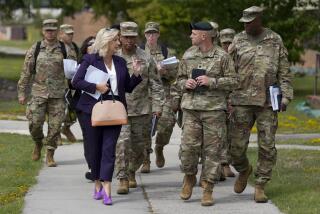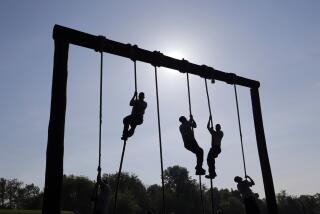Fears Amid the Dreams
SAN DIEGO — In time of war, their sons joined the branch of the military most likely to send them into combat.
It is with a mix of pride and fear that parents of Marine Corps recruits come here to watch their sons graduate from the grueling, 13-week ordeal called boot camp.
Many of the parents at last week’s graduation for recruits of Mike Company strongly opposed their sons’ decision to enlist in the Marine Corps.
Some tried to talk them into choosing the Navy or Air Force, services where pay and benefits are the same but the chances of fighting in Iraq or another war zone are remote.
“I never wanted him to enlist, but he was determined,” said Debbie Kypke of Sacramento, the mother of Andrew Vinton, 18. “He has to follow his heart, even if mine is breaking.”
Thoughts of Iraq and the mounting death toll of Marines were never far away for Kypke and other parents.
One mother said she kept showing her son newspaper stories about Marines killed in Iraq in hopes that he could be persuaded not to enlist.
Others said they broke into tears when their sons first mentioned the Marine Corps.
Still, the young men persisted and joined the 17,000 to 18,000 others who come to the Marine Corps Recruit Depot here each year to see if they are tough enough to be Marines. (The San Diego depot trains only men; women are trained at Parris Island, S.C.)
To be sure, there is an economic motive behind the decision to join. For many, college was not an easy option; others lived in areas where jobs were scarce. But there is something else, a factor that parents acknowledge, sometimes reluctantly. The lure of tradition, ritual and duty is strong for many young men, even in a time of war.
As several hundred parents and other family members gathered to watch the recruits of Mike Company receive the eagle-globe-and-anchor insignia, the training depot’s commander, Brig. Gen. John M. Paxton Jr., was candid about what lay ahead.
Parents, he suggested, needed to accept what the recruits already realized.
“They know that many of them will be going in harm’s way within a year or 18 months,” he told the parents. “They need to know that their family stands behind them.”
The general’s directness had a sobering effect on family members.
“I’ve never been so proud and so scared at the same time,” said Geri Moen of Coeur d’Alene, Idaho, whose son is Kevin Moen, 19.
The company first sergeant, as he read aloud a list of places where Marines have fought and died, included Afghanistan and Iraq. With their parents listening, he told the new Marines that their main duty was to uphold the Marine Corps tradition.
“You will not let them down,” 1st Sgt. Michael Johns said in a stern tone that suggested an order.
Bobbie Samme of upstate Wisconsin, her eyes red with tears after watching her son jog past with his platoon in a “motivation run,” remembered that her brother did three tours in South Vietnam.
“I just hope he doesn’t have to go” to Iraq, Samme said of her son, Eric Palmisano, 26. “I remember what my mother went through with my brother.”
Some parents said they hung up on recruiters when they called. Some of those same parents wore sweatshirts reading: “My Son Is A Marine.”
“The eliteness of the corps attracted my son; he’s like that,” said Margaret Chambers of Flint, Mich, whose son is Stephen Chambers, 20. “I try not to think about Iraq, but it’s scary -- very scary.”
Part of the recruiting pitch of the Marine Corps is that it is elite with a difficult rite of passage.
In his 1997 book “Making the Corps,” journalist Thomas Ricks wrote that the Marines “play the role in the American working class that the Ivy League colleges have played for the upper middle class.”
Some parents joke about the clash between their fears and their son’s dreams.
“My emotional, estrogen side is opposed to this,” said Penni Warford of Folsom, Calif., the mother of Nate Grimes, 18. “But my logical side knows this is what he wanted.”
As soon as a recruit enlists, the Marine Corps tries to heal any breach that exists between the corps and the parents. Recruits are not allowed phone calls or e-mails during boot camp, but each recruit is issued stamps and ordered to write home regularly.
The average trainee receives 54 letters and writes a similar number. Parents are directed to websites and support groups to track the progress of boot camp.
Graduation extends over two days, and ceremonies are full of Marine Corps history and ritual. Forty-two graduations are held each year, and the routine varies only slightly.
Brig. Gen. Paxton leads the platoons in the motivation run; a Marine band plays the Marine Corps hymn and the elegiac “Going Home” by Antonin Dvorak; the depot’s mascot bulldog, Lance Cpl. Molly Marine, mingles freely.
Family members are shown a movie about the Marine Corps, taught the Marine “Ooh-rah!” yell, and introduced to the depot’s drill instructors, whose authoritarian ways and booming voices have transformed the recruits from civilians to Marines. Mike Company family members gave the drill instructors a standing ovation.
When a recruit joins the Marine Corps, Paxton told the group, “we enlist the entire family.”
Few parents would disagree. Their sons’ precarious future is now their future as well.
“I’ll be praying every day,” said Kris Falvo of Tulsa, Okla., whose son, Philip, 19, like the other new Marines, will report soon to Camp Pendleton for infantry training.
More to Read
Sign up for Essential California
The most important California stories and recommendations in your inbox every morning.
You may occasionally receive promotional content from the Los Angeles Times.










